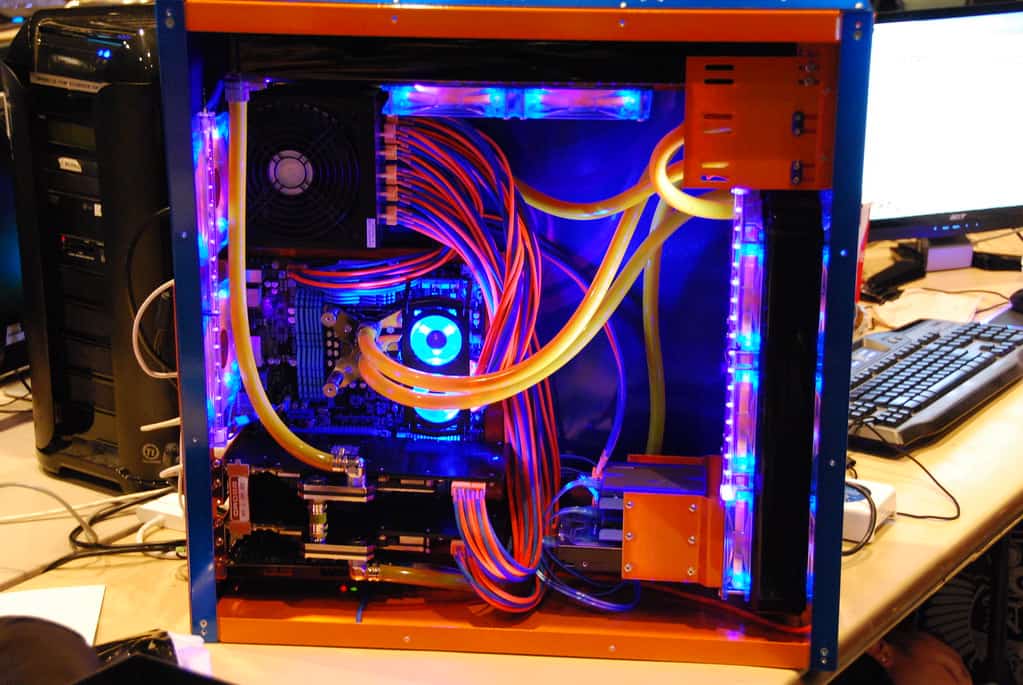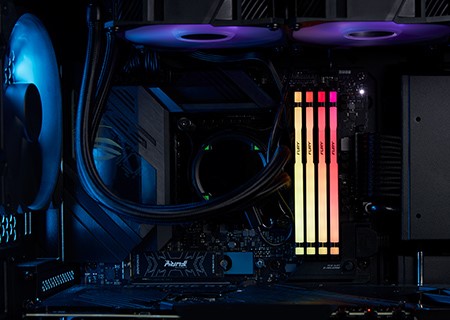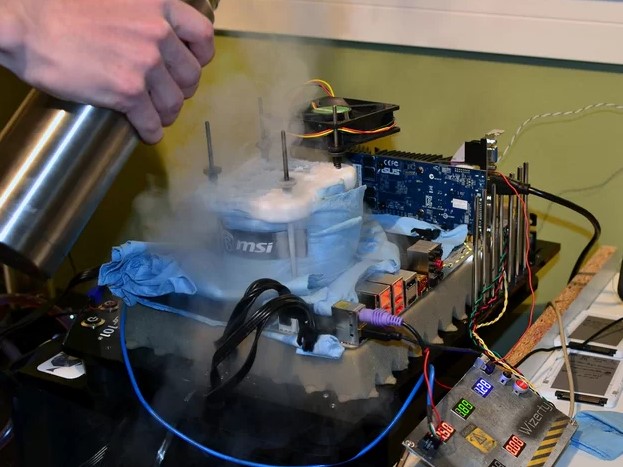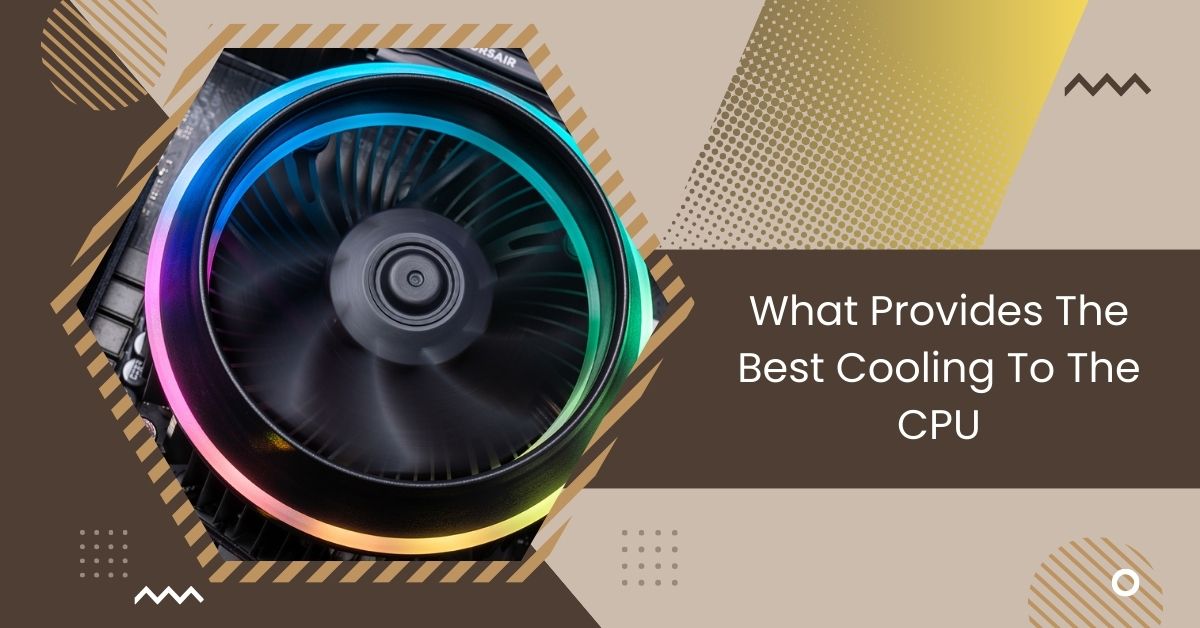In the realm of computer hardware, the Central Processing Unit (CPU) stands as the brain of any system, executing countless tasks with lightning speed.
For superior CPU cooling, liquid cooling systems outperform air cooling solutions. Options like the Lian Li Galahad II Performance 360 or the Deepcool AS500 Plus offer top-notch performance, ensuring stable operation under heavy loads.
In this article, we will discuss “What Provides The Best Cooling To The CPU.”
Liquid Cooling
Liquid cooling systems utilize a special liquid, like water or coolant, to cool down the CPU. Instead of using just air, which air cooling systems rely on, liquid cooling circulates this liquid through tubes.
The liquid absorbs heat from the CPU and then travels to a radiator, where it releases the heat into the air.
This process is more efficient than air cooling, making liquid cooling popular for high-performance computers.
1. How Does It Work?
In a liquid cooling system, a liquid such as water or coolant flows through tubes connected to the CPU.
This liquid absorbs heat from the CPU and then travels to a radiator. Here, the heat is released into the air, cooling down the liquid.
This process is more efficient than air cooling, making liquid cooling a preferred choice for high-performance computers.
2. Liquid Cooling Pros

- Superior heat dissipation: Liquid cooling systems are highly efficient at dissipating heat from the CPU, ensuring optimal performance even under heavy loads.
- Quieter operation: Compared to air cooling solutions, liquid cooling setups produce less noise, providing a quieter computing environment.
- Aesthetically pleasing: Liquid cooling systems often feature sleek designs and customizable RGB lighting options, enhancing the visual appeal of the computer.
Read: CPU Light Turns Red Then Off – How To Fix – 2024!
3. Liquid Cooling Cons
- Higher cost: Liquid cooling systems are generally more expensive than air cooling solutions, making them less accessible for budget-conscious users.
- Complexity: Installing and maintaining a liquid cooling setup can be more complex than air cooling, requiring additional components such as a radiator, pump, and tubing.
- Risk of leakage: There is a small risk of leaks occurring in liquid cooling systems, which could damage other computer components if not detected and addressed promptly.
4. Razer Hanbo Chroma – processor liquid cooling system
The Razer Hanbo Chroma is a high-performance liquid cooling system designed to maintain optimal CPU temperatures during intense gaming and demanding tasks.
With its sleek design and customizable RGB lighting, it offers both efficient cooling and aesthetic appeal, making it a popular choice among gamers and PC enthusiasts alike.
5. CORSAIR iCUE H150i ELITE CAPELLIX – processor liquid cooling system
The CORSAIR iCUE H150i ELITE CAPELLIX is a top-tier liquid cooling solution engineered to keep your CPU running cool under heavy workloads.
Featuring a high-capacity radiator and powerful fans, it efficiently dissipates heat while offering customizable RGB lighting effects through the iCUE software.
Its performance and aesthetics make it a favourite among gamers and enthusiasts.
6. Cooler Master MasterLiquid ML360R RGB processor liquid cooling system
The Cooler Master MasterLiquid ML360R RGB is a premium liquid cooling solution designed to effectively cool your processor while adding a touch of style to your PC build.
With its large 360mm radiator and vibrant RGB lighting, it delivers exceptional cooling performance and aesthetic appeal, making it a popular choice among gamers and enthusiasts seeking both functionality and visual flair.
Air Cooling
Air cooling is a popular method of keeping your CPU cool without the need for liquid-based solutions.
It typically involves a heatsink and fan setup, where the fan blows cool air over the heatsink to dissipate heat generated by the CPU.
Air cooling is affordable, easy to install, and suitable for most PC builds.
Read: What Is VDDCR CPU Voltage? – Optimize CPU Voltage Settings!
1. How Does It Work?
Air cooling works by utilizing a combination of heatsinks and fans to dissipate heat generated by the CPU.
The heatsink, usually made of metal, absorbs heat from the CPU. Then, the fan blows cool air over the heatsink, which helps to transfer the heat away from the CPU and into the surrounding environment.
This continuous airflow keeps the CPU operating at a safe temperature, preventing overheating and ensuring optimal performance.
2. Air Cooling Pros

- Cost-effective: Air cooling solutions are generally more affordable than liquid cooling systems, making them accessible to users on a tight budget.
- Low maintenance: With no liquid components to worry about, air coolers require minimal maintenance, typically consisting of occasional dusting to maintain optimal performance.
- Wide compatibility: Air coolers come in various sizes and designs, making them compatible with most CPU sockets and PC cases and offering flexibility in system builds.
3. Air Cooling Cons
- Limited cooling potential: Compared to liquid cooling, air cooling may have lower thermal dissipation capabilities, especially in extreme overclocking scenarios or high-performance builds.
- Noisy operation: Air coolers can produce more noise than liquid cooling solutions, particularly at higher fan speeds, which may be bothersome for users seeking a quieter computing environment.
- Bulky design: Some air coolers feature large heatsinks and fans, which can obstruct other components on the motherboard or interfere with RAM clearance, limiting compatibility in compact PC cases.
Read: Do CPU Coolers Come With Thermal Paste – A Complete Guide
4. Tripp Lite Portable Cooling Unit Air Conditioner Conditioning 12K BTU Gen2
The Tripp Lite Portable Cooling Unit is an efficient air conditioning solution, delivering 12,000 BTUs of cooling power to keep your equipment cool in server rooms, data centres, and other IT environments.
Its compact design and easy mobility make it ideal for spot cooling in areas with limited space.
5. RackSolutions – rack fan
RackSolutions offers a range of rack fans designed to improve airflow and cooling efficiency within server racks.
These fans help dissipate heat generated by networking equipment and servers, preventing overheating and ensuring optimal performance.
With easy installation and various size options, RackSolutions rack fans provide effective cooling solutions for any server room setup.
6. Tripp Lite Wall Mount Rack Enclosure Cooling Roof Fan Kit 120V 5-15P
The Tripp Lite Wall Mount Rack Enclosure Cooling Roof Fan Kit, with a 120V power supply and 5-15P plug, enhances airflow in wall-mount rack enclosures.
It effectively dissipates heat buildup, ensuring optimal operating temperatures for networking equipment and servers.
Easy installation and compatibility with Tripp Lite enclosures make it a convenient cooling solution for IT environments.
Read: CPU Core Ratio Sync All Cores Or Auto – System Optimization!
Liquid vs Air Cooling Your PC: Key Factors to Consider
Now that you understand the fundamentals of liquid cooling and air cooling, along with their advantages and disadvantages, let’s explore some additional factors to aid in determining the best option for your setup:
1. Cost
When deciding between liquid and air cooling, factor in your budget. Air coolers are typically cheaper upfront, while liquid cooling setups can be pricier but may offer better performance.
2. Overclocking

For overclocking enthusiasts seeking maximum performance, liquid cooling systems often provide superior thermal management, allowing for higher overclocking potential compared to air coolers.
3. Size/Clearance
Ensure compatibility with your PC case and motherboard by checking the dimensions of your chosen cooling solution.
Air coolers may require more space due to their bulky heatsinks, while liquid cooling systems require adequate clearance for radiators and tubing.
Read: Docker Incompatible CPU Detected: Check Compatibility – 2024
4. Style
Consider the aesthetic appeal of your cooling solution. Air coolers come in various designs, while liquid cooling setups offer customizable RGB lighting and sleeker profiles.
Choose a style that complements your PC build and personal preferences.
Best CPU Coolers 2024: AIO and Air Coolers
Discover the latest advancements in CPU cooling technology for 2024, with a focus on both All-In-One (AIO) liquid coolers and traditional air coolers.
From enhanced cooling efficiency to quieter operation, these cutting-edge solutions offer improved performance and reliability, ensuring your CPU stays cool under heavy workloads for optimal system stability and longevity.
Read: Bad CPU Type In Executable Homebrew – Ultimate Guide In 2024
[SOLVED] – What is the best CPU cooling method?
The question of the best CPU cooling method depends on various factors such as budget, performance requirements, and personal preferences.
While air cooling is budget-friendly and easy to install, liquid cooling offers superior thermal performance, especially for overclocking enthusiasts. Ultimately, the best choice varies based on individual needs.
Air Cooling vs. Liquid Cooling in PC Builds
When deciding between air cooling and liquid cooling for your PC build, it’s essential to consider factors like cost, performance, and ease of installation.
Air cooling is typically more budget-friendly and straightforward, while liquid cooling offers superior thermal performance and aesthetics, albeit at a higher price point and complexity. Choose based on your priorities and requirements.
Read: Plex Media Scanner High CPU – Click For The Complete Detail!
Are CPU Air Coolers Effective?
CPU air coolers are effective at dissipating heat from the processor, keeping it within safe operating temperatures.
While not as efficient as liquid cooling systems, air coolers are budget-friendly and suitable for most PC builds, offering reliable thermal management for casual users and gamers alike.
What is the best way to cool down a PC CPU fan or water-cooling system?
The best way to cool down a PC CPU is through a fan or a water-cooling system. Both methods efficiently dissipate heat from the CPU, ensuring optimal performance and longevity.
Which cooling option is good for CPU? Liquid cooling or air cooling?
Both liquid cooling and air cooling are viable options for CPU cooling, but their effectiveness depends on various factors, such as performance requirements, budget, and maintenance preferences.
Read: AVConferenced CPU – Boost Your Conference Experience – 2024
What is liquid cooling, and how does it work?
Liquid cooling is a CPU that utilizes a closed-loop system to circulate liquid coolant, absorbing heat from the CPU and transferring it to a radiator for dissipation, ensuring efficient cooling.
Best CPU coolers in 2024
The best CPU coolers in 2024 include top-performing air coolers like Noctua NH-D15 and liquid coolers like Corsair H115i RGB Platinum, offering efficient cooling performance for various PC setups.
What provides the best cooling to the CPU fan
The best cooling solution for a CPU typically depends on individual preferences and needs. Both air coolers and liquid cooling systems offer effective ways to dissipate CPU heat, each with advantages and considerations.
What provides the best cooling to the CPU for gaming
For gaming, a liquid cooling system often provides the best cooling for the CPU. Liquid coolers can efficiently dissipate heat, allowing for prolonged gaming sessions without overheating, which is crucial for optimal performance.
Read: Cannot Pin ‘Torch.Cuda.Longtensor’ Only Dense CPU Tensors Can Be Pinned
Water cooling vs air cooling benchmarks
Water and air cooling benchmarks compare the performance of both cooling methods in dissipating CPU heat. To determine effectiveness, these benchmarks evaluate factors like temperature reduction, noise levels, and overclocking capabilities.
What’s the best cooling system for PC?
Determining the best cooling system for a PC depends on performance needs, budget, and personal preferences. Air and liquid cooling are popular, offering effective solutions for keeping the CPU and other components cool.
What is the most extreme PC cooling method?
The most extreme PC cooling method is often considered submersion cooling, where the entire PC or components are submerged in a non-conductive liquid coolant, ensuring maximum heat dissipation and potentially allowing for extreme overclocking.
What is the best way to cool CPU?
The best way to cool a CPU depends on performance needs, budget, and personal preferences. Air and liquid cooling are popular options, each with advantages and considerations.
What is the best type of cooler for CPU?
The best type of cooler for a CPU depends on individual preferences and needs. Air and liquid coolers are popular choices, offering effective ways to dissipate heat from the CPU, with considerations like performance, noise levels, and maintenance.
Read: How Tight Should CPU Cooler Be – Expert Tips On CPU Cooler!
Related Questions
1. What is the best type of cooling for your CPU, air cooling, liquid cooling, or sub-zero?
The best type of cooling for your CPU depends on factors like budget and performance needs. Air cooling is cost-effective, while liquid cooling offers superior thermal performance, and sub-zero cooling is extreme but expensive.
2. What are the best materials for processor cooling?
Common materials for processor cooling include copper and aluminium heatsinks, as well as thermal paste or thermal pads for efficient heat transfer.
3. Which of the following provides the BEST cooling to the CPU?
Liquid cooling typically provides the BEST cooling to the CPU, offering superior thermal performance compared to air cooling and extreme cooling solutions like sub-zero cooling.
4. Are there any risks associated with overclocking and cooling solutions?
Overclocking can increase power consumption and heat generation, potentially leading to system instability or hardware damage if not adequately cooled.
5. Is it necessary to apply thermal paste when installing a CPU cooler?
Yes, thermal paste ensures optimal thermal conductivity between the CPU and cooler, maximizing heat transfer efficiency.
Conclusion
In conclusion, the choice between liquid cooling and air cooling for your CPU hinges on factors like budget, performance needs, and personal preferences. Consider these aspects carefully before making your decision.
Also Read
- Is 40c Good For CPU – Find Out If 40°C Perfect Temperature!
- IS 50 DEGREES CELSIUS HOT FOR A CPU – Complete Guide!
- Rcu_sched Self-Detected Stall On CPU – Know The Truth – 2024

Hi everyone, Johns Jack here, your approachable tech aficionado! I’m passionate about CPUs and thrive on keeping up with the newest tech developments. Join me as we delve into the dynamic realm of technology! Visit: Techy Impacts

